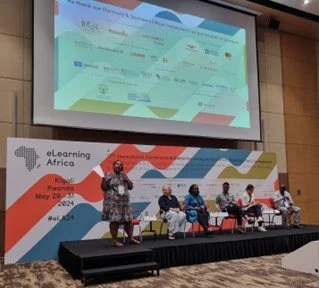eLearning Africa 2024 – How can we improve outcome assessment through learning analytics?
Left to right, Dr. Ronda Zelezny-Green, Isabel Tarling PhD, Professor Christine Ofulue, Nkosinathi Hlongwane, Dr. Samira ElAtia & Professor Chrispen Chiome.
This week some of the team attended the 17th edition of eLearning Africa in Kigali, Rwanda. This blog highlights some of the insights shared during the ‘Leveraging Learning Analytics for Outcome Assessment’ session at one of the continent’s largest and most comprehensive knowledge-sharing events for e-learning, training and skills.
Learning analytics has fundamentally transformed outcome assessment in education, providing invaluable tools for institutions to enhance teaching quality, monitor student progress, offer timely feedback, and facilitate more strategic decisions. During the panel discussion, moderated by Dr. Ronda Zelezny-Green, co-founder of Panoply Digital and datocracy, the session delved into the critical role of learning analytics in creating personalised learning experiences that propel students' potential by ensuring equitable access to high-quality education.
Ronda opened the session by emphasising the importance of data-driven decisions, noting that ‘without data, decisions are merely based on opinion’. She set the tone for a rich discussion on the transformative power of learning analytics in education.
Ronda moderates the - Leveraging Learning Analytics for Outcome Assessment panel discussion.
First up, we heard from Isabel Tarling PhD, CEO & Founder of Limina, a South Africa-based platform fostering lifelong learning through collaborative course design and course development processes. Isabel shared insights from a monitoring and evaluation study, underscoring the need to make learning visible to improve educational outcomes. She highlighted that to enhance learning, it is crucial to focus on feedback mechanisms that provide 'calibration'—aligning what students think they know with their actual performance. To nurture healthy learning spaces Isabel let us in on the ‘ABC’ model whereby A stands for ‘Affective’ - emotions and beliefs, build motivation, trust and encouragement. B stands for ‘Behaviours’ - engagement, active learning, goal setting and self-assessment. C stands for ‘Cognitive’ – think and talk about learning processes and how to improve them. She ended her presentation by sharing that Limina's system engages roughly 190,000 users showcasing its significant reach and impact.
Next up Nkosinathi Hlongwane, Team Lead at Adapt IT, South Africa, discussed the importance of software development in analysing student performance through Learning Management Systems (LMS). He pointed out that while tools have become more accessible, their adoption remains challenging. Sharing insights from Adapt IT, Nkosinathi stressed the importance of not only focusing on student engagement with content and using data to analyse academic performance but also understanding what lecturers’ and teachers' needs are. Nkosinathi also touched on predictive analytics, which he explained, are essential for identifying potential dropouts and implementing early interventions. He finalised with a critical statistic: 60% of first-year students drop out due to economic challenges, underscoring the need for data-driven support strategies.
Professor Chrispen Chiome from Zimbabwe Open University then stepped up to emphasise the indispensable role of teachers in achieving education for all. He discussed how technology enhances self-awareness, reflective competencies, learning analytics, and learning design. By personalising learning journeys, educators can predict and support at-risk students more effectively. Chrispen then distinguished between predictive analytics, which forecast outcomes, and adaptive and engagement analytics, which tailor educational experiences to individual needs.
Championing gender equality we then heard from Dr. Samira Elatia, Associate Dean at the University of Alberta, Canada, as she addressed the gender imbalance in the educational workforce. Despite women comprising approximately 80% of the workforce, only 13% hold senior roles, and 34% drop out of their positions in schools in Canada early on in their careers, often down to childcare responsibilities. Samira noted that it takes an average of seven years for women to reach senior positions, again often due to parental leave. She shared more on the intelligent data acquisition model for data management and integration created as part of the multidisciplinary ‘Educational Leadership at the Intersection of Gender’ study at the University. This model addressed the gap by collecting data on the experiences of women in leadership positions in schools via an accessible and user-friendly data system using SQL to support gender equity in academic career advancement.
Last but by no means least, Christine Ofulue from the National Open University of Nigeria (NOUN), discussed the challenges and opportunities of open and distance learning. High attrition rates, partly due to the flexibility of open universities, pose significant challenges despite enabling access to individuals who cannot commit to in-person learning. Christine then delved into how NOUN used a 6-step approach including stakeholder consultations and system-wide integrated responses to collate information on 150,000 students, 500 academics/facilitators across 121 study centres to aggregate findings and inform actions.
NOUN's approach includes understanding learning demographics, academic characteristics, and performance metrics to enhance research capacity and mainstream learning analytics. This enabled dataset analysis of around 54,500 student records across three pilot courses to pinpoint factors that could impact academic performance. This was done through correlation analysis and predictive modelling to identify key influences and markers of student success.
The session concluded with a dynamic Q&A, where Ronda encouraged the audience to participate and ask questions about key topics covered including, measuring lecturer contributions in online learning and improving student interactions to mitigate loneliness. One key takeaway was the role of gamification in engaging students and encouraging them to set and achieve goals. This approach motivates learners and provides parents with accessible, color-coded data to monitor progress.
Ronda then wrapped up the session by reiterating that data-driven decisions are crucial for advancing education. The insights shared by the panellists underscored the transformative power of learning analytics in creating more effective, inclusive, and engaging learning environments. As we move forward, the challenge lies in harnessing this power to ensure that all students, regardless of their circumstances, can succeed.


